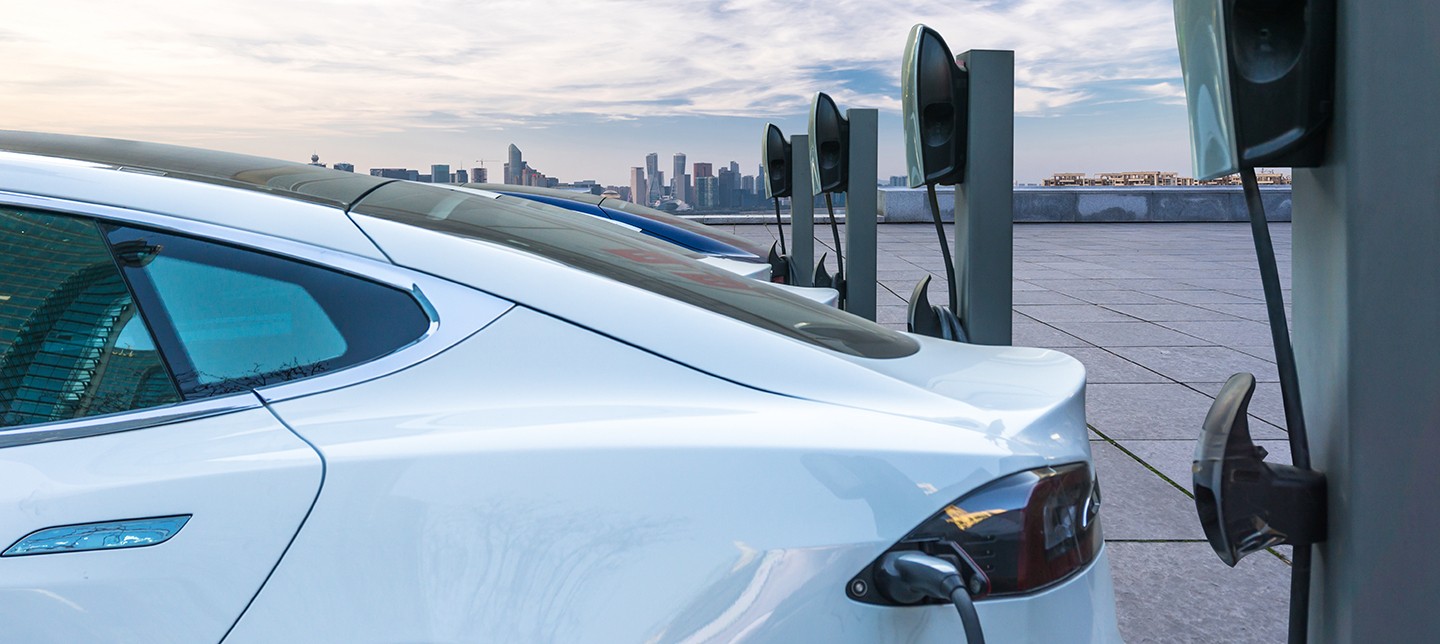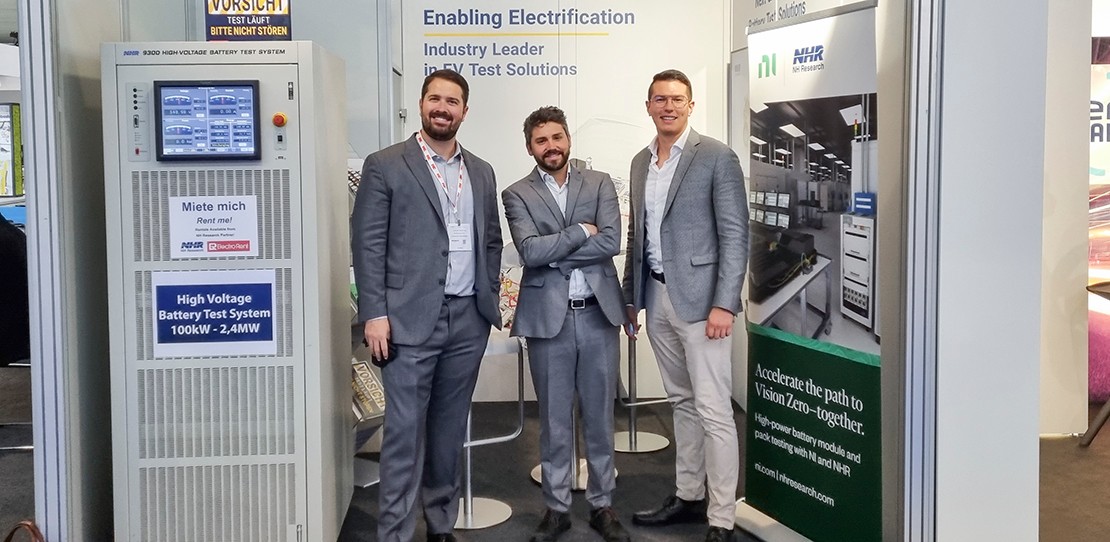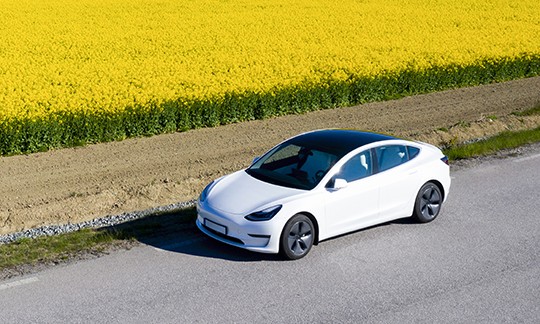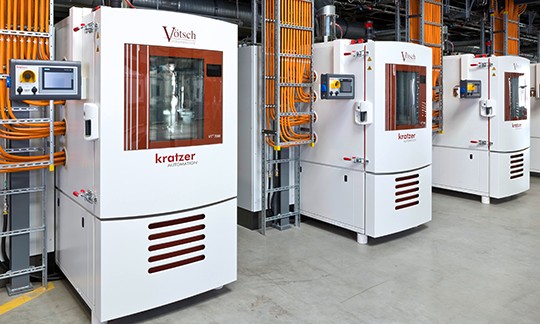
NI Acquires NH Research to Power the Future with Electric Vehicles
TREND INSIGHT
TRANSPORTATION | 6 MINUTE READ
NI acquires NH Research, expanding electrification, battery, and sustainable energy capabilities for our customers to enable acceleration for electric vehicle (EV) testing and production.
For many of us, electric cars have felt like an unattainable luxury item rather than an everyday means of transportation. But even if a traditional fuel-powered vehicle is sitting in your garage, it’s clear that the EV revolution is accelerating. GM announced that its entire Cadillac lineup will be electric by 2030. Volvo said it will only make electric cars by that same year, and Honda plans to phase out all gas cars by 2040. These are just a handful of automakers shifting towards EVs.1
This industry-wide transition is driven in large part by consumer concerns related to global warming. These concerns are understandable, with multiple UN 2021 climate reports affirming that our planet is destined for a hotter future. Traditional vehicles have largely contributed to the situation, with the EPA reporting that transportation caused 29 percent of the total 2019 greenhouse gas emissions in the United States. But COVID-19 shutdowns around the world in 2020 showed just how much reducing fuel-powered vehicle traffic affects the atmosphere. In India, the Himalayan Mountain chain was visible from over 100 miles away for the first time in decades.2 Air pollution studies across two western Indian cities found an 80.18 percent reduction in NO2 during the 2020 lockdown compared to just one year prior.3
Less pollution may slow down the rate of rising temperatures, but globally, roads remain dominated by gas-powered vehicles. Despite this discouraging fact, automakers continue to set aggressive targets to achieve zero emissions while reimagining their fleets. Deloitte reports that this “significant growth of EVs leading up to 2030 will present major opportunities and challenges for traditional original equipment manufacturers (OEMs), new-entrant OEMs, captive finance companies, and dealerships.”
The challenges we face are indeed complicated. We need a significant ramp up in new electric powertrain technologies and faster product development cycles—all while driving down costs and ensuring quality.
Based on what we know about market demand and the industry’s response to climate change, the question isn’t why have automakers accelerated their EV plans but rather: What’s stopping them?
Perhaps the most pivotal component of an EV is its battery. Automakers aren’t just on a sprint to meet their EV targets; they’re also competing to see who can produce the safest and highest performing battery. Afterall, vehicle recalls due to fire hazards have significant ramifications, both in terms of cost and consumer trust. Manufacturers want to claim their batteries have the longest range and can be charged the fastest. Of course, the only way to truthfully make such claims is with data derived from extensive testing.
Testing, however, can be a major bottleneck on the path to zero emissions. Many companies that quickly pivoted to EV initiatives have had no choice but to perform cumbersome, time-consuming testing with tools that are disparate and disconnected.
The fact is that inflexible and siloed testing approaches result in inefficiencies in product workflows. Plus, they significantly slow time to market. Recent moves by NI may help untangle the “testing roadblock.”
On October 28, 2021, NI announced the acquisition of NH Research (NHR), a leader in high-power test and measurement EV/battery applications. NI also entered an agreement to purchase the EV systems business of Heinzinger GmbH, an expert in high-current and high-voltage power systems. These acquisitions will expand NI’s EV, battery, and sustainable energy portfolio, thereby providing customers with critical power-level test capabilities.

Power electronics require highly specialized equipment that uses large amounts of power. An EV industry forerunner, NHR provides next generation power electronic test solutions for leading OEMs, Tier 1–3 suppliers, and researchers. NHR test solutions include battery test systems, battery emulators, grid simulators, AC/DC loads, and AC/DC sources.
As EV growth accelerates, engineers must address new testing challenges, including higher voltage and power levels, increased energy density, long test times, costs, better performance, and faster time to market. NHR’s test equipment provides advanced performance, modular and scalable power, flexible configurations, integrated safety, wider operating envelopes, and faster response times to emulate real-world conditions.
Because of the capabilities obtained through its acquisition of NHR, NI is better equipped to serve these two main applications:
High-Power Battery Module and Pack Testing
By precisely handling power to and from the battery (cycling), engineers can test batteries as if they were in operation. Following profiles of acceleration, braking, charging, environmental conditions, and more, engineers validate their batteries’ range and performance down to the last mile and test for algorithms that improve the safety and performance of the whole EV drive train.
Battery Emulation
Engineers can test for the control, safety, and durability requirements for the battery, inverter, motor, onboard charger, or even the full drive unit, using power electronics devices to emulate various battery behavior.
NI has long possessed the measurements capabilities and software for automating and customizing test and data analytics. Now, with the integration of NHR, it can also offer the power electronics required to complete automakers battery or battery-related systems to test in a fully software-connected toolchain.
“NI plus NHR equals faster time to market for our EV customer base,” said Peter O’Brien, NH Research vice president of Sales and Marketing. “The investment and collaboration with NI will allow NHR to offer more complete and more open electrification solutions.”
Peter added, “NI’s expanded software connected capabilities take battery test systems to the next level without increasing complexity and test times. These new capabilities include data management, data analytics, and other important system-level elements that are critical to EV test. Moving forward, we’ll be scaling the business by adding additional resources where our customers need us most to ensure value realization and their success.”
Ultimately, this acquisition of NHR helps customers accelerate product development to deliver vital EV technologies to market faster. By combining the strength of its flexible, software-connected EV test platform with power conversion and electrification test systems expertise, NI will be able to facilitate rapid responses to changing test needs. These additional capabilities will accelerate time to market and help the automotive industry meet its ambitious targets without sacrificing quality or innovation.
Testing is a critical step at each stage of product development that should not prevent automakers from reaching EV and emission targets. Seamless test systems drive performance, catch defects before they become catastrophic problems, enhance product design, and ultimately ensure the safety and quality consumers deserve.
To keep up with the rapid pace of innovation, automotive companies need a step-function shift in the testing methodologies they use for automotive and subsystems—especially in electric powertrains that include batteries, inverters, and motors. Software-centric solutions streamline data and analytics across development stages and yield the quickest, highest quality production possible. The updated NI portfolio offers solutions that will save time and resources and allow automated data collection through a software-connected toolchain.
Together, NI, NHR, and Heinzinger offer superior test systems, providing highly complementary positions in testing components and systems used in the automotive industry. They aim to help customers alleviate testing gridlock and rapidly accelerate EV production.
“The addition of expertise and complementary capability from these two leading technology companies will help strengthen and expand our systems offerings to shared customers in the fast-growing area of electrification,” said Eric Starkloff, NI president and CEO.
______________________________________
1 Every Automaker’s EV Plans Through 2035 And Beyond. Forbes, October 4, 2021.
2 People in India can see the Himalayas for the first time in ‘decades’ as the lockdown eases air pollution. CNN, April 9, 2020.
3 Positive effects of COVID-19 lockdown on industrial cities (Ankleshwar and Vapi) of Western India. Scientific Reports, February 19, 2021.



